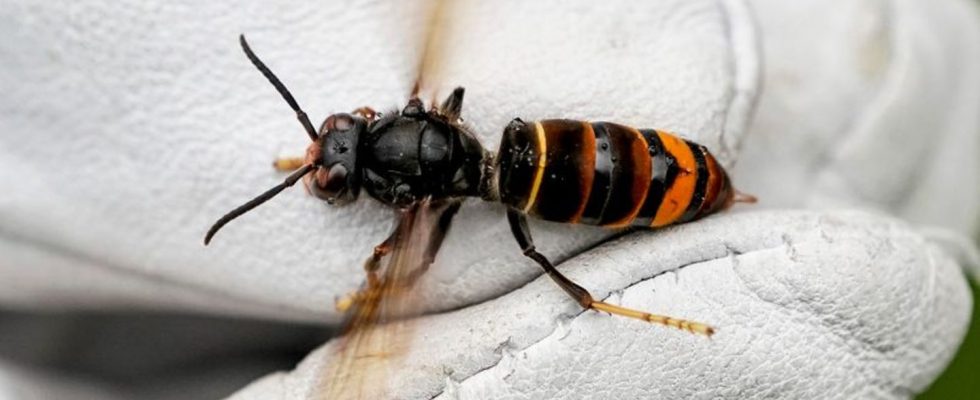Invasive species
Asian hornets are spreading in Germany: What does this mean for nature?
The Asian hornet eats other insects. photo
© Axel Heimken/dpa
For several years now, the Asian hornet has become increasingly popular in Germany. Now experts are concerned about the development and are warning in some cases about its spread.
Baden-Württemberg, Rhineland-Palatinate and North Rhine-Westphalia are also severely affected, said Benjamin Waldmann, consultant for invasive species at the Baden-Württemberg Ministry of the Environment. The mild winter and the continued mild weather without permanent frost this spring are likely to cause the animal (Vespa velutina) to multiply again over the course of the year.
Hornets have already been spotted in several federal states
On a map of the animals’ occurrence recently completed by the State Institute for Bee Science at the University of Hohenheim in Stuttgart, a sighting of the hornet in Berlin last September was recorded for the first time – “far away from previous occurrences,” said Waldmann.
According to the Nabu Nature Conservation Association, the animal has not yet penetrated too far to the east. But there are also settlements in Lower Saxony, Bavaria and Hesse as well as Hamburg. “Spread to other federal states is possible and to be expected,” says the Federal Agency for Nature Conservation (BfN). All of this is of great concern to conservationists.
Effects not yet foreseeable
“It is impossible to predict how this rapidly spreading species will affect our native insect world,” says Martin Klatt, bee expert from the Nabu regional association in Baden-Württemberg. There is no research into how the Asian hornet relates to the native and protected European hornet, nor how the prey of other insects affects it.
The Asian hornet hunts honey bees, but also eats flies, beetles and wild bees. A large nest with a thousand or more Asian hornets consumes significantly more than eleven kilos of insects per year, said Kristin Krewenka from the Baden Beekeepers Association. Asian hornets also like to bite into fruit. According to Nabu, the stings are no more dangerous for humans than those of native wasp species.
It is unclear what damage this hornet could cause beyond the feared loss of insect species. At the beginning of March, the German Beekeepers Association warned of potential dangers not only for beekeeping, but also for agriculture. He referred to a study on damage to fruit and wine growing in Galicia and Portugal.
Came to stay – and what you can do anyway
What to do about the introduced species? The affected federal states rely on reporting portals where sightings and nests of the animals can be displayed. In Baden-Württemberg there were 550 reported nests last year – a twentyfold increase compared to the previous year. According to the local Ministry of the Environment, around 430 nests were reported and removed in Rhineland-Palatinate in 2023. Nobody knows how high the number of unreported cases is.
The federal state of Saxony-Anhalt, which has so far been virtually unaffected, has recently also feared that the Asian hornet could colonize and in mid-March called for sightings to be recorded on a reporting portal. In general, the federal states are in constant communication on the subject of invasive species, emphasizes the BfN. “A common, nationwide reporting platform for early detection types is also currently being discussed by the federal states.”
Animals
Gigantic, poisonous, voracious: the most extreme snake species in the world
No one among experts believes that the Asian hornet will ever disappear from Germany again. “The drops sucked,” says Waldmann. “All we can do is limit it.”
The Asian hornet (Vespa velutina) should not be confused with the Asian giant hornet (Vespa mandarinia). The latter is spreading in the USA, for example. The species does not occur in Germany.

